 MyDogBreeds
MyDogBreeds Both Native American Indian Dog and Doxiepoo are originated from United States. Native American Indian Dog may grow 9 cm / 4 inches higher than Doxiepoo. Native American Indian Dog may weigh 113 kg / 250 pounds more than Doxiepoo. Native American Indian Dog may live 4 years more than Doxiepoo. Native American Indian Dog may have more litter size than Doxiepoo. Native American Indian Dog requires High maintenance. But Doxiepoo requires Moderate maintenance
Both Native American Indian Dog and Doxiepoo are originated from United States. Native American Indian Dog may grow 9 cm / 4 inches higher than Doxiepoo. Native American Indian Dog may weigh 113 kg / 250 pounds more than Doxiepoo. Native American Indian Dog may live 4 years more than Doxiepoo. Native American Indian Dog may have more litter size than Doxiepoo. Native American Indian Dog requires High maintenance. But Doxiepoo requires Moderate maintenance
 The Native American Indian Dog is an ancient breed, that some consider to be feral. It is a landrace breed that developed with the indigenous peoples North America. These dogs originally looked and sounded like wolves and it is likely that their ancestry is tied to wolves crossed with pre-Columbian American dogs that came to the America’s with the first peoples. There are some that believe the Native American Indian Dog is a connecting line back to the dogs or wolves that over 12,000 years ago were the first to be domesticated by human beings.
The Native American Indian Dog is an ancient breed, that some consider to be feral. It is a landrace breed that developed with the indigenous peoples North America. These dogs originally looked and sounded like wolves and it is likely that their ancestry is tied to wolves crossed with pre-Columbian American dogs that came to the America’s with the first peoples. There are some that believe the Native American Indian Dog is a connecting line back to the dogs or wolves that over 12,000 years ago were the first to be domesticated by human beings.
They are now a rare breed in the wild and a small group of domesticated dogs. Fossil studies in recent years suggests that the Native American Indian Dogs came to North America about 4500 years after the first indigenous peoples. It is believed that the Native Americans bred the dogs that traders and explorers brought with them to the native coyote as well. This created a breed specific to North America and called the Common Native Dog or the Common Indian Dog. The original NAID was a mix of many different breeds of dogs and wild canines.
Today’s NAID is said to be raised on Indian reservations in the United State and represent a mix of Chinook, Husky, German Shepherd Dog and Malamute, along with perhaps some of today’s wolf mixed in. This dog is raised domestically and is socialized to life with humans. They are the last remaining breed from all the Native North American dogs that lived with the original people of the Americas. They are also thought to have an ancestry similar to the Australian Dingo.
They are a devoted, protective and loyal breed though they tend to be shy. They need to be outside for the majority of the day and don’t do well in crates. They need a fenced yard and room to roam. They are working dogs that hunted, pulled sleds and guarded their homes. They still need a job to so.
Today the North American Indian Dog is being bred to replicate the temperament and appearance of the originals. Although there are many breeders working from the founding breeder with original stock, there are only six that are officially given authorization to breed the NAID. They are registered by Terra Pines with the National Kennel Club but not recognized by the AKC and UKC.
The breed name NAID is trademarked by Karen Markel of Majestic View Kennels in the 1990’s. Today the breed is nationally recognized as a breed very much like the original Native American dogs, The breed is intelligent and quite healthy. They enjoy people and engage in many companion activities.
Whatever its true ancestry the current Native American Indian Dog (NAID), today’s version is not recognized by the AKC, but they are recognized by the Dog Registry of America, the Native American Indian Dog Registry and the National Kennel Club.
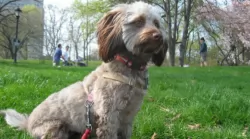 The Doxiepoo is a designer dog breed - a combination of the Dachshund who was used to hunt for Badgers and the Poodle, a dog bred in France to essentially be a lap dog. There is however some dispute as to whether the Poodle descends from Germany or from the French Barbet.
The Doxiepoo is a designer dog breed - a combination of the Dachshund who was used to hunt for Badgers and the Poodle, a dog bred in France to essentially be a lap dog. There is however some dispute as to whether the Poodle descends from Germany or from the French Barbet.
Wherever the parents hail from, the Doxiepoo hails from the United States of America.
With both the Poodle and the Dachshund being intelligent, fun and loving type of canines, the two of them together have brought out a wonderful hybrid pet in the Doxiepoo. Today, the Doxiepoo is bred with other Doxiepoos.
 There are two sizes of the North American Indian Dog – they are medium and large. They have dense short double coats, or they have long top coats and a fairly dense undercoat. They come in a variety of colors mostly black or silver but there is also a tortoiseshell. These tortoiseshell colored dogs are considered by Native Americans to be sacred beings. These tortoiseshell dogs are strikingly good looking and are called Spirit Dog.
There are two sizes of the North American Indian Dog – they are medium and large. They have dense short double coats, or they have long top coats and a fairly dense undercoat. They come in a variety of colors mostly black or silver but there is also a tortoiseshell. These tortoiseshell colored dogs are considered by Native Americans to be sacred beings. These tortoiseshell dogs are strikingly good looking and are called Spirit Dog.
They all have the look of a Siberian Husky or Alaskan Malamute with upright ears and almond shaped eyes that are anywhere from amber to brown with some blue. Usually their tails are down and long but can be curled. They resemble the wolf and have that wild, feral appearance. They can be as large as over one hundred pounds or average seventy to eighty pounds. They are strong, alert and intelligent. They are considered to be hypoallergenic, shedding their coat only once a year.
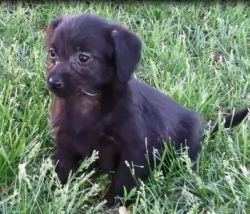 The Doxiepoo can range from being a small to medium sized dog, standing at anything between 20cm to 25cm in size and weighing between 3kg and 7kg, depending much on whether a standard, miniature or toy sized poodle was used in the breeding.
The Doxiepoo can range from being a small to medium sized dog, standing at anything between 20cm to 25cm in size and weighing between 3kg and 7kg, depending much on whether a standard, miniature or toy sized poodle was used in the breeding.
The Doxiepoo could look like either one of the two breeds, but he will have a strong, sturdy body with a curly or wavy coat of varying lengths and various colors - cream, black, tan, apricot, grey or white. The poodle side of him ensures he is a hypoallergenic dog.
Between the Dachshund and the Poodle, you’re going to get a wonderful array of characteristics as they both come with their strong points. Certainly you will be well entertained and amused by your pet, while he can also be useful as a watchdog.
Being a small dog, he will fit well into life in the city or in the countryside. He is as bright as a button and learns tricks and new skills quickly. With training and socialization he becomes obedient and well behaved wherever he is, getting on well with other pets in the home as well as with all children and adults.
The Doxiepoo is a lively, alert, energetic dog and will require being exercised – lots of ball games and a walk will keep him lean, muscular and content.
 This breed is gentle and loving with children.
This breed is gentle and loving with children.
Endurance, strength and good health.
Low adaptability to small living spaces and lack of outside space; don’t do well in crates and need an experienced dog owner.
They are highly intelligent, love to learn and are just a little stubborn.
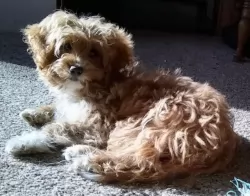 Every dog, even the little ones like this, will require some kind of input from you if you want to get the best from him. Every puppy bought as a gift when they’re cute and cuddly turns into an adult, and often the very person who received him as a gift, loses interest and neglects him. Then they wonder why the dog becomes irritating and destructive.
Every dog, even the little ones like this, will require some kind of input from you if you want to get the best from him. Every puppy bought as a gift when they’re cute and cuddly turns into an adult, and often the very person who received him as a gift, loses interest and neglects him. Then they wonder why the dog becomes irritating and destructive.
A dog is a long term investment and if you commit to your sweet Doxiepoo, you’ll get years and years of devoted friendship.
 This is a fairly healthy, long lived breed having spent so much of its history in isolation. They are prone to some of the issues that affect all medium to large breeds.
This is a fairly healthy, long lived breed having spent so much of its history in isolation. They are prone to some of the issues that affect all medium to large breeds.
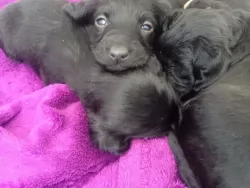 The life expectancy of the Doxiepoo is around 12-15 years of age if he is well looked after. He is a robust dog, but he can still face some health issues that both his parents contend with.
The life expectancy of the Doxiepoo is around 12-15 years of age if he is well looked after. He is a robust dog, but he can still face some health issues that both his parents contend with.
Just some of the diseases that the Doxiepoo might face while in your care are ear- and skin infections, dental disease, digestive tract problems, heart conditions and epilepsy. If you think your pet has any kind of illness, it is imperative to get him to the vet for a checkup.
Poodles, particularly are prone to skin disorders. They can be allergic to grass, parasites and food. If your Doxiepoo chews or licks his paws or some other area a lot, and the skin is red, he could have a skin allergy.
The vet will be able to diagnose your dog’s allergies with some skin- or blood testing. For instance, sebaceous adenitis is an inherited allergy that affects the lubrication of the skin and hair follicles. Symptoms of the disease include scaly skin, sore and even hair loss.
 Because of their propensity to grow to quickly the puppy should only stay on puppy food for 8-10 months. Feed them a high quality large dog puppy food 3-4 times daily for a total of 2-21/2 cups per day.
Because of their propensity to grow to quickly the puppy should only stay on puppy food for 8-10 months. Feed them a high quality large dog puppy food 3-4 times daily for a total of 2-21/2 cups per day.
Feed a high protein, large dog dry food twice a day for a total of two cups. Do not over feed. Do not feed right before or after exercise do to the risk of bloat.
Healthy, strong long lived dog.
This is not an indoor, couch potato dog. They need exercise and they need space. They won’t do well as apartment dogs unless you can take them to a dog park for over an hour every day. They really need a large fenced in yard. They don’t do well in crates either. He doesn’t understand crates and thinks you are punishing him. They make great hunters, search and rescue dogs, service dogs and therapy dogs. They will succeed at pulling competitions and weight competitions.
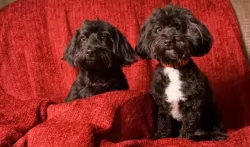 You can’t be sure what kind of coat your Doxiepoo will have but he will certainly require brushing at least twice a week. In some instances it may be wise to seek out the services of a professional groomer who does an excellent job of trimming the hair, cleaning the teeth, checking the ears and clipping the nails.
You can’t be sure what kind of coat your Doxiepoo will have but he will certainly require brushing at least twice a week. In some instances it may be wise to seek out the services of a professional groomer who does an excellent job of trimming the hair, cleaning the teeth, checking the ears and clipping the nails.
The Doxiepoo, just like any other dog, will need to be trained and socialized early as he is a stubborn dog and will need to be trained to be obedient. With this training and socialization, he becomes amicable around children and pets in the home. He learns easily too and this is what makes him a great pet for first time dog owners.
The Doxiepoo is a moderate energy dog, so he will do well on a walk every day. You can also make use of ropes, balls and frisbees to give him a bit of a workout in the garden.
He loves water too and will enjoy a run on the beach and cooling off in the ocean. He adapts easily to life in the city or in the country, so long as he is with his human companions.
The Doxiepoo will eat dry kibble, particularly if it is from the highest quality brands and chosen according to the dog’s size, age and activity levels.
Now and then you can add in a little bit of cooked rice, vegetables and chicken for variety. Some raw meat can play an important role in keeping the skin healthy and free from dryness and itchiness. Make sure that he always has fresh, cool water available to him.